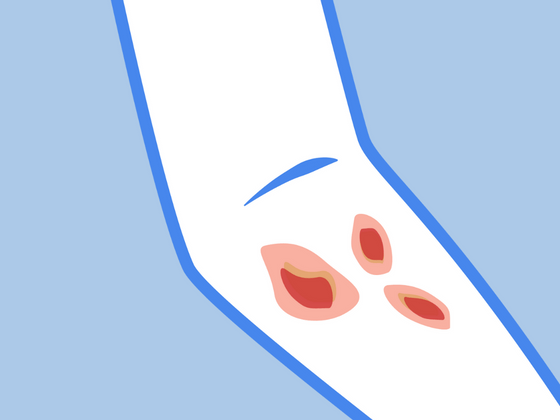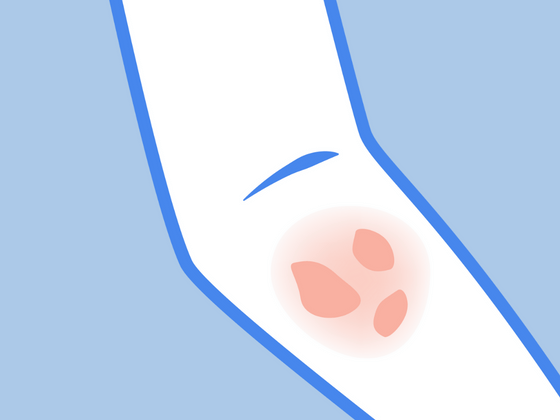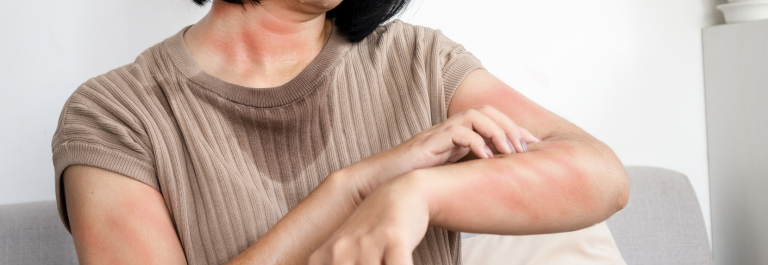Facial eczema (atopic dermatitis) involves uncomfortable, itchy, inflamed, and sometimes discolored skin. Many people struggle to find a treatment that works long-term. One of the best ways to manage facial eczema is by establishing a consistent skincare routine that strengthens the skin barrier and minimizes triggers.
Taking the right steps in your skincare can help reduce flare-ups and keep your eczema-prone skin healthy. In this post, we'll cover:
-
How to support a healthy skin barrier
-
Steps to gently care for eczema-prone and sensitive skin
-
Our top products for eczema-prone skin
Read on to find out how proper skincare routine can make a significant difference in managing facial eczema and improving the comfort and health of your skin.
What Is Facial Eczema?
Facial eczema is a chronic skin condition that affects the face, causing redness, itchy skin, dryness, and flaky patches. For people with eczema, the skin often reacts differently to environmental triggers and certain skincare products, making it harder to maintain a healthy complexion. Additionally ,the skin barrier in those with eczema is often compromised, leading to eczema symptoms like redness, irritation, and small bumps.
To manage eczema-prone skin, it’s essential to focus on strengthening the skin barrier, keeping the skin well-moisturized, and minimizing contact with irritants. Without proper care, flare-ups can become more frequent and lead to long-term damage, including skin discoloration and discomfort.
Steps for Caring for Eczema-Prone Skin
Start with a Gentle Cleanser
When washing your face, use a fragrance-free and gentle cleanser designed for sensitive skin. A great option is this Organic Calendula Face Wash, which contains organic calendula flowers. Its cooling gel-like consistency makes it a perfect choice for inflamed skin. Additionally, when washing your face, avoid harsh soaps and detergents, as they can strip your skin of its natural oils and irritate your already sensitive skin. Wash with warm water rather than hot, which can further dry out the skin. After cleansing, gently pat your skin dry with a soft towel instead of rubbing.
Moisturize Immediately
Once your face is clean, apply a thick, fragrance-free moisturizer that contains hydrating ingredients like hyaluronic acid or mineral oil. Moisturizing right after washing helps seal in moisture, which is crucial for maintaining a healthy skin barrier. Consider using this Calendula Facial Cream, which contains calendula resins to reduce itching and minimize scarring, as well as MSM to reduce hyperpigmentation and smooth uneven skin tone. This gentle, rejuvenating cream will help your skin shine while soothing irritation.
Use Anti-inflammatory Treatments
If your skin feels especially inflamed or if you’re experiencing an active eczema flare, consider using a topical treatment that helps reduce inflammation. For example, the Aloe Vera for Eczema Skin Soothing Spray is a great option, offering immediate cooling relief to dry, inflamed, and itchy skin. This natural spray can calm irritated areas, helping to manage discomfort during flare-ups. For more severe symptoms, you may need to consult a board-certified dermatologist for prescription-strength creams to help manage your symptoms.
Avoid Common Irritants
People with facial eczema often find that certain ingredients or environmental factors can trigger flare-ups. Avoid skincare products that contain harsh chemicals, fragrances, or alcohol, as these can irritate eczema-prone skin. Consider patch-testing new products for a few weeks before applying them all over your face to avoid any adverse effects.
Skip Makeup
Wearing makeup during a flare-up can worsen symptoms. If you must wear makeup, use gentle brushes and makeup products designed for sensitive skin, such as mineral-based foundations that won’t irritate the skin. Avoid powder products, as they can dry out the skin further and draw attention to flaky patches.
Manage Environmental Factors
Extreme temperatures, stress, and allergens can all trigger eczema flares. Keeping stress levels low, managing allergies, and protecting your skin from harsh weather conditions can help prevent flare-ups. Wearing sunscreen daily (even in winter) is also crucial to protect sensitive skin from sun damage.
Manage Your Facial Eczema Today
Managing facial eczema requires patience and careful attention to your skin's needs. By sticking to a skincare routine, using eczema friendly products and avoiding triggers you can keep eczema under control and have a healthier looking skin.








